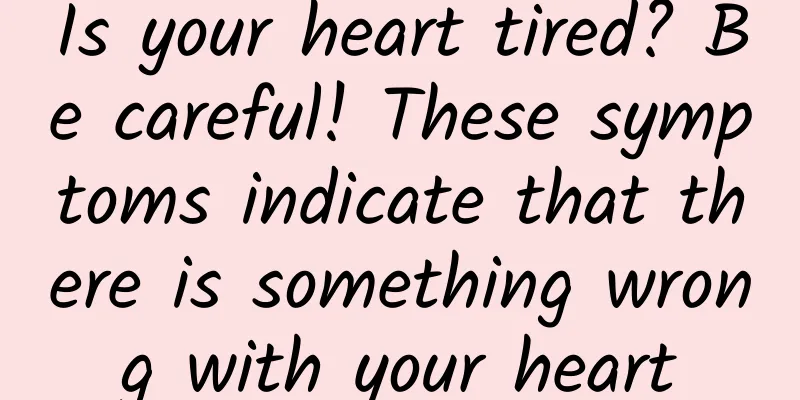Is your heart tired? Be careful! These symptoms indicate that there is something wrong with your heart

|
The dangers of heart disease have long been known to people, but few people can understand its symptoms. Some people have already developed symptoms of heart disease but are unaware of it. What symptoms indicate heart disease and how to make a correct judgment? What are the symptoms of a bad heart? 1. If I have symptoms such as chest tightness, palpitations, and chest pain, does that mean I have a heart disease? Not necessarily. Wang Xian, director of the Institute of Cardiovascular Diseases at Beijing University of Chinese Medicine, said that common symptoms of heart disease include chest tightness, palpitations, and chest pain, but the presence of these symptoms does not mean that it is a heart disease, but may also be caused by an imbalance in the regulation of nerve function. In addition, chest tightness and palpitations may also occur during strenuous exercise or excessive fatigue, but it should be distinguished that chest tightness and palpitations caused by non-cardiac organic lesions will not last long and may get better after rest, while heart disease patients will experience increased discomfort when they are active. Therefore, it is recommended that, for the sake of insurance, people who experience this symptom should go to the hospital for further diagnosis to determine whether they have heart disease. In clinic, we often see symptoms of heart disease caused by neurosis. That is to say, after examination, the patient has no organic heart disease, but always feels very anxious, or chest tightness, discomfort, and difficulty breathing. This is more common in women. This is because under the influence of anxiety, tension, emotional excitement, mental trauma and other factors, the excitement and inhibition process of the human central nervous system is impaired, and the cardiovascular system regulated by the autonomic nervous system is also disordered, causing a series of symptoms of excessive sympathetic tension. Such people should learn to reduce stress, relax, exercise moderately, and receive psychological treatment when necessary. 2. Some young people often have accelerated heartbeats. Is this a sign of heart disease? Most young people who experience this condition may not have heart disease, especially young women. In addition, people without underlying diseases may experience accelerated heartbeats when they are emotionally unstable, nervous, frightened, after exercise, excessive smoking, or drinking. If these symptoms occur under the above conditions, don't worry too much. But a fast heart rate is definitely not good. If an adult's heart beats more than 100 times per minute, it is considered tachycardia, which is likely to increase the risk of cardiovascular disease. Therefore, we should learn to control our emotions, exercise moderately, quit smoking and limit alcohol. 3. My heart often skips a beat and it feels like it has stopped beating. Is this a heart attack? This problem should be taken seriously, as it may be premature beats. The incidence of premature beats is very high, and it can occur in both healthy people and people with heart disease. Factors such as mental stress, drinking, drinking coffee, and poor sleep are triggers. Premature beats can be benign or malignant. Premature beats without heart disease are benign. If the symptoms are not obvious and have no impact on life, no treatment is required. However, if premature beats are caused by coronary heart disease, high blood pressure, etc., they should be taken seriously. Therefore, if you find premature beats, you should go to the hospital and let the doctor check whether you have underlying heart disease. 4. I feel uncomfortable when I catch a cold, with palpitations, chest tightness, and shortness of breath. Is this related to the heart? There is a certain relationship. If you have chest tightness, shortness of breath and other symptoms after a cold and fever, it is recommended to go to the hospital for an electrocardiogram. If premature beats and conduction block are found, be alert to viral myocarditis. But don't be nervous, because most people's discomfort is transient, and few people actually develop severe viral myocarditis. In life, we should strengthen exercise to prevent colds. 5. What symptoms should indicate a heart attack? There are many manifestations of heart disease. For example, patients with coronary heart disease and angina pectoris may have symptoms such as chest tightness, heartache, palpitations, shortness of breath, and tight throat. They may also have atypical angina pectoris symptoms such as stomachache, abdominal pain, dizziness, and bloating. Pain and edema in both lower limbs may also be manifestations of heart failure. It is best to go to the hospital immediately to detect the condition in time. 6.What is the most effective way to prevent heart disease? Simply put, there are two types: one is to change your lifestyle, quit smoking and drinking, exercise appropriately, eat regularly, combine meat and vegetables, and eat less greasy food; the other is evidence-based medication for high-risk groups. For example, people with high blood pressure must take antihypertensive drugs regularly as prescribed by the doctor, patients with diabetes must control their blood sugar, and people with high blood lipids must manage their blood lipids. Eat six kinds of food to protect your heart Beans. Beans such as black beans, soybeans, peas, broad beans, lentils, and chickpeas are rich in nutrition, low in fat and high in protein. They are rich in complex carbohydrates, dietary fiber, and active substances such as polyphenols and saponins, which help lower cholesterol. A comprehensive analysis involving 25 related studies found that eating 130 grams of bean food every day can reduce "bad cholesterol" (low-density lipoprotein) by 0.17 mmol/L and systolic blood pressure by 2.25 mmHg. The study also found that eating a cup of beans (about 200 grams) a day can reduce body weight by 0.34 kg and reduce total body fat by 0.34%. Coffee. Coffee is rich in bioactive polyphenols (mainly chlorogenic acid), caffeine (a stimulating alkaloid), and a large amount of the mineral potassium. A 16-year follow-up survey of 186,000 participants found that compared with people who did not drink coffee, participants who drank at least 4 cups of coffee a day had an 18% lower risk of premature death (including cardiovascular disease death). Drinking 1 cup of coffee a day can also reduce the risk of premature death by 12%. The main effects of polyphenols in coffee include: lowering blood sugar concentration, inhibiting fat absorption, and promoting the decomposition of triglycerides in adipose tissue. Tea. Tea is rich in flavonoids and polyphenol antioxidants. A study involving 66 patients with coronary heart disease found that regular drinking of black tea can significantly improve endothelial health and reverse vasomotor dysfunction in patients with coronary heart disease. A large-scale study in China involving 200,000 men and 300,000 women found that drinking tea (any kind of tea) every day can reduce the risk of ischemic heart disease by 8% and the risk of heart disease by 10%. Experts say it is best not to add sugar, sweeteners or cream to tea. Mushrooms. A large number of clinical studies have found that eating mushrooms regularly protects the heart. Mushrooms have anti-inflammatory and antioxidant effects, and help increase vitamin D levels in the body. The various amino acids and beta-glucan (polysaccharide) in mushrooms can prevent atherosclerosis, lower blood pressure and lipids, and regulate the immune system. Eating mushrooms regularly can also reduce complications of heart disease, such as metabolic syndrome, type 2 diabetes, and obesity. Foods rich in omega-3 fatty acids. Omega-3 fatty acids with heart-protecting effects can be divided into marine-derived omega-3 polyunsaturated fatty acids and plant-derived alpha-linolenic acid. The former mainly includes deep-sea fatty fish such as salmon, tuna, and mackerel. A large-scale analysis study involving 220,000 participants found that eating fish in moderation can reduce the risk of death from coronary heart disease by 7%. Plant-derived omega-3 fatty acids mainly include green leafy vegetables, walnuts, rapeseed oil, soybean oil, flaxseed oil, etc. Foods rich in vitamin B12. Vitamin B12 deficiency can easily lead to serious blood diseases and neurological diseases. Several large-scale prospective studies have found that vitamin B12 supplementation can reduce the risk of cardiovascular disease or recurrence. Foods rich in this nutrient include lean meat, fermented soy products, etc. 8 guardian angels protect the heart Guardian Angel No. 1: Omega 3 fatty acids Hiding place: salmon, sardines, walnuts, etc. Omega-3 fatty acids are polyunsaturated fatty acids that help prevent systemic inflammation and cardiovascular disease and protect the heart. A Harvard University study found that eating fish once or twice a week to take about 2 grams of omega-3 fatty acids can reduce the risk of sudden cardiac death by 36% and reduce the possibility of death by 17%. In addition to salmon, sardines and other deep-sea fish, walnuts, flax seeds, perilla seeds and the oil extracted from them are also good sources of omega-3 fatty acids. Guardian Angel No. 2: Magnesium Hiding places: whole grains, nuts, etc. Magnesium helps reduce the excitability of nerves and muscles, maintain heart elasticity, and prevent strokes and heart attacks. Insufficient magnesium intake may cause blood pressure to rise. Studies have shown that adequate magnesium supply in the diet is beneficial for preventing high blood pressure, heart disease, and diabetes. Women are more likely to be deficient in magnesium than men, and stress can also consume the body's magnesium reserves, so it is necessary to pay attention to supplementing it in the diet. Magnesium is commonly found in whole grains such as millet and red beans, nuts such as pine nuts and walnuts, and green leafy vegetables such as spinach and rapeseed. Guardian Angel No. 3: Vitamin D Hiding places: mushrooms, eggs, etc. In addition to being good for bone health, vitamin D is also good for heart health. Studies have shown that if the human body lacks vitamin D, the risk of heart disease will increase by 40%, and the chance of death from heart disease will be higher than 81%. Vitamin D sources in food are not abundant, only a few sources such as fish (especially fish liver), mushrooms, animal offal, whole milk, eggs, etc. However, everyone can get more sun exposure, which is the main source of vitamin D for the human body. Patron Saint No. 4: Zinc Zinc can help the body produce anti-inflammatory cytokines, just like omega-3 fatty acids, which helps prevent inflammation in the body. Zinc has also been shown to protect arteries, help prevent coronary artery disease, and improve heart function. Zinc is mainly found in protein-rich foods, such as shellfish, shrimp, crabs, offal, meat, and fish. Among seeds, sesame seeds, sunflower seeds, and pine nuts also contain high levels of zinc. Guardian Angel No. 5: Vitamin C Hiding place: Fresh fruits and vegetables such as kiwi and green pepper Vitamin C is a strong antioxidant. Studies have found that it helps lower the level of low-density lipoprotein cholesterol (commonly known as "bad" cholesterol) and increases the level of high-density lipoprotein cholesterol (commonly known as "good" cholesterol). People with high vitamin C intake in their diet have a lower risk of heart disease and stroke. The main source of vitamin C is fresh fruits and vegetables, among which citrus fruits and tomatoes are the best sources of vitamin C. It is also rich in green peppers, spinach, kiwis, and fresh dates. Guardian Angel No. 6: Vitamin E Hiding place: Nuts, seeds, etc. Vitamin E is also a strong antioxidant. Like vitamin C, it can regulate cholesterol levels in the body, inhibit platelet aggregation, and reduce the risk of myocardial infarction and stroke. Various nuts and seeds are rich in vitamin E. Avocados are also rich in vitamin E among fruits and can be eaten often. Guardian Angel No. 7: Allicin Hiding place: Garlic Allicin helps relax blood vessels and improve blood flow, thus playing a positive role in blood pressure and heart health. It should be noted that garlic contains active substances such as alliin and allinase, which will come into contact with each other after being crushed, thus forming allicin with health benefits. Therefore, it is best to mash garlic into a paste and let it sit for 10 to 15 minutes before eating, so that allicin can be better absorbed, while cooking will yield very little allicin. Guardian Angel No. 8: Lycopene Hiding place: tomatoes, watermelons, etc. Lycopene is a carotenoid with strong antioxidant effects. It has been proven to help prevent cancer and heart disease. Studies have shown that the higher the lycopene content in human fat tissue, the lower the risk of myocardial infarction. Lycopene can also increase arterial elasticity, improve endothelial function, and prevent arteriosclerosis. Lycopene is generally found in red foods, such as tomatoes and watermelons. To protect your heart, press three heart-protecting points Pressing the Shenmen acupoint can help you sleep and prevent dementia. Emotional distress can affect your sleep. Shenmen is the original acupoint of the heart meridian, which is the gateway to calming the mind. Pressing this acupoint before going to bed can help you feel sleepy and regulate sleep disorders. Regular massage can also prevent and treat dementia. Shenmen acupoint also has a good effect in treating motion sickness. Shenmen acupoint is located very deep, and you need to press it hard with the inner side of the thumb knuckle to achieve a certain amount of stimulation and produce a therapeutic effect. Plucking Jiquan can measure heart function. Jiquan is located at the apex of the armpit, where the axillary artery pulsates. It can not only regulate heart rhythm and treat pain in the ribs, but is also a key acupoint for detecting cardiovascular health. The detection method is to press Jiquan with your thumb and then pluck it. When plucking it, you will touch many "small tendons" and produce a numbness that is transmitted to the fingers. If the numbness is obvious, it means that the heart meridian is unobstructed and the cardiovascular function is normal; if it only hurts but not numb and is not transmitted when plucking, it proves that there is congestion in the cardiovascular system; if there is no pain or numbness, it means that the cardiovascular system is not supplied with enough blood. For heartache and fatigue, press Tongli. People with bradycardia often have positive reaction points such as tenderness and nodules at the Tongli acupoint (one finger upward from the wrist crease on the little finger side). Pinch this acupoint 36 times as one time, and pinch it 3 to 5 times to soothe the mind. When office workers are tired from work, they can make fists with both hands, put the inside of their wrists on the edge of the table, and push from the Tongli acupoint to the elbow, repeating 30 to 50 times, which can not only rest the brain but also dredge the heart meridian. |
<<: How to preserve Hami melon in summer? What color of Hami melon is delicious?
Recommend
Where do the eggs go after a fallopian tube ligation?
When a woman no longer wants to have children but...
The road to kidney disease is long and the symptoms are always there
Author: Chen Zhou, attending physician of the Nep...
Canalys: India's smartphone market shipments reached 33.5 million units in the first quarter of 2020, up 12% year-on-year
A report recently released by Canalys shows that ...
Will uterine fibroids of 1 cm disappear?
Uterine fibroids are a common disease among middl...
How to remove armpit hair for girls
Is it normal for girls to have hair under their a...
Pregnant woman with bleeding like menstruation
Whether spotting during the fourth month of pregn...
Is 34 weeks of pregnancy considered premature for twins?
If many people have twins or are pregnant with tw...
How to treat lung metastasis of malignant hydatidiform mole
Malignant hydatidiform mole is a type of cancer. ...
Slimming leg exercises before bed, say goodbye to thick legs
For white-collar workers who sit in the office fo...
If women don’t do these nine things after dinner, they will be more beautiful in ten years
1. Don’t eat fruit immediately. Fruits contain fl...
What kind of tea should women drink to maintain health?
With the development of economy and the improveme...
Why does the vagina itch after an abortion?
After having an abortion, the vagina will be pain...
What should I do if I see blood on my due date?
What is the reason for spotting during delivery? ...
Can a pregnant woman with low blood pressure give birth naturally?
If a pregnant woman has low blood pressure, she m...









![[Weight loss tips] Sit-ups are the fastest way to lose weight in the abdomen](/upload/images/67ce23ae1c75b.webp)